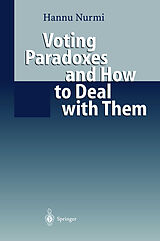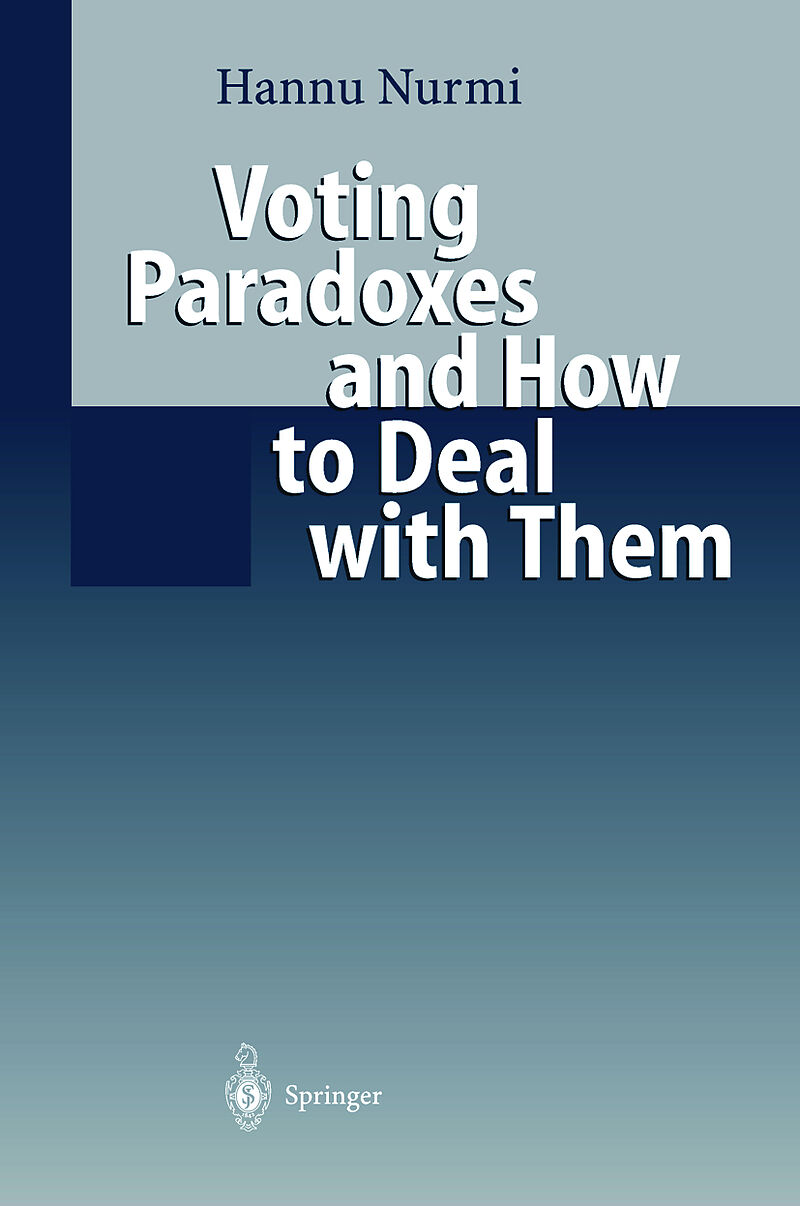Voting Paradoxes and How to Deal with Them
Einband:
Fester Einband
EAN:
9783540662365
Untertitel:
Englisch
Autor:
Hannu Nurmi
Herausgeber:
Springer Berlin Heidelberg
Auflage:
1999
Anzahl Seiten:
168
Erscheinungsdatum:
17.09.1999
ISBN:
3540662367
Voting paradoxes are unpleasant surprises encountered in voting. Typically they suggest that something is wrong with the way in dividual opinions are being expressed or processed in voting. The outcomes are bizarre, unfair or otherwise implausible, given the expressed opinions of voters. Voting paradoxes have an important role in the history of social choice theory. The founding fathers of the theory, Marquis de Condorcet and Jean-Charles de Borda, were keenly aware of some of them. Indeed, much of the work of these and other forerunners of the modern social choice theory dealt with ways of avoiding paradoxes related to voting. One of the early paradoxes, viz. that bearing the name of Condorcet, has subsequently gained such a prominent place in the literature that it is sometimes called the paradox of voting. One of the aims of the present work is to show that Condorcet's is but one of many paradoxes of voting. Some of these are pretty closely interrelated making it meaningful to classify them. This is the second main aim of this book. The third objective is to suggest ways of dealing with paradoxes. Since voting is and has always been an essential instrument of democratic rule, it is of some in terest to find out how voting paradoxes are being dealt with by past and present methods of voting. Of even greater interest is to find ways of minimizing the probability of occurrence of various paradoxes. By their very nature some paradoxes are unavoidable.
classification of numerous voting paradoxes * includes suggestions for practical voting system design
Klappentext
Voting paradoxes are unpleasant surprises encountered in elections. They pertain to such phenomena as additional support being detrimental for candidates and not voting leading to better outcomes than voting for some voters. No voting system is immune to all paradoxes and, therefore voting paradoxes are being dealt with by all voting systems currently in use. How they are and how they should be handled is the main subject of this book. The book outlines, explains and classifies a number of paradoxes: Borda`s and Condorcet`s classic ones, several monotonicity and compound majority paradoxes as well as some paradoxes of representation. Both theoretical and practical ways of avoiding them are discussed.
Inhalt
Introduction.- Basic Concepts and Tools.- Alternatives and Opinions.- Preference Profile.- Pairwise Comparison and Tournament Matrix.- McGarvey`s Theorem.- Paradoxes of the Enlightenment Era.- Borda`s Paradox.- Condorcet`s Paradox.- Borda and Condorcet Compared.- How Frequent Are the Paradoxes?.- The Geometry of Voting.- The Saari Triangles.- The Conditions of Paradoxes.- The Paradoxical Act of Voting.- The Cost Calculus.- The No-Show Paradox.- Monotonicity Paradoxes.- Additional Support Paradox.- Preference Truncation Paradox.- How to Deal with Monotonicity Paradoxes?.- Compound Majority Paradoxes.- Ostrogorski`s Paradox.- Anscombe`s Paradox.- The Paradox of Multiple Elections.- The Referendum Paradox.- Simpson`s Paradox.- How to Deal With Compound Majority Paradoxes.- Intra-Profile Paradoxes.- Pareto Violations.- Inconsistency Paradox.- Choice Set Variance Paradoxes.- The q-Rules and Pareto Violations.- Tournament Solutions to Voting Paradoxes.- Paradoxes of Representation.- The Alabama Paradox.- Other Paradoxes of Hamilton Apportionments.- Schwartz`s Paradox of Representation.- How to Deal with Representation Paradoxes.- Classification of Paradoxes.- Hard and Soft Solutions.

Leider konnten wir für diesen Artikel keine Preise ermitteln ...
billigbuch.ch sucht jetzt für Sie die besten Angebote ...
Die aktuellen Verkaufspreise von 6 Onlineshops werden in Realtime abgefragt.
Sie können das gewünschte Produkt anschliessend direkt beim Anbieter Ihrer Wahl bestellen.
Loading...
Die aktuellen Verkaufspreise von 6 Onlineshops werden in Realtime abgefragt.
Sie können das gewünschte Produkt anschliessend direkt beim Anbieter Ihrer Wahl bestellen.
| # | Onlineshop | Preis CHF | Versand CHF | Total CHF | ||
|---|---|---|---|---|---|---|
| 1 | Seller | 0.00 | 0.00 | 0.00 |
